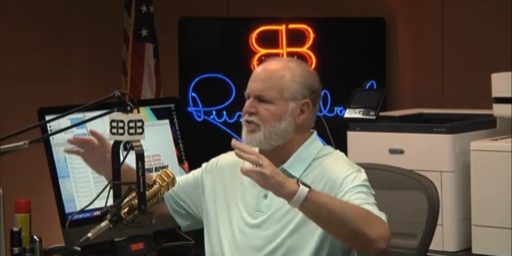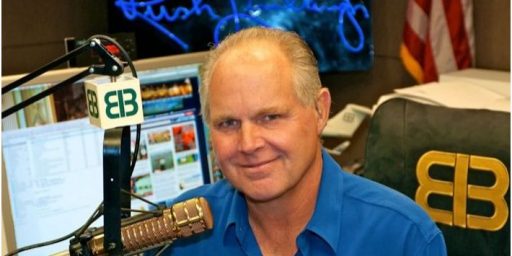RUSH REDUX
Evan Thomas has a long piece on Rush Limbaugh and the oxycontin saga in Newsweek. It is not flattering.
Rush Limbaugh has always had far more followers than friends. Bombastic and clowning on air, shy and bumptious off it, Limbaugh could count on 20 million “Dittoheads” and talk-radio fans to tune in five days a week. But it’s hard to find many people who really know him. He was a lonely object of mass adulation, socially ill at ease, at least occasionally depressed and, for the past several years, living in a private hell of pain and compulsion.
***
The man behind the curtain is not the God of Family Values but a childless, twice-divorced, thrice-married schlub whose idea of a good time is to lie on his couch and watch football endlessly. When Rush Limbaugh declared to his radio audience that he was “your epitome of morality of virtue, a man you could totally trust with your wife, your daughter, and even your son in a Motel 6 overnight,” he was acting. He “regards himself as an entertainer who is very pleased that people pay attention to his political views,” says Wall Street editorial writer John Fund, who collaborated with Limbaugh on one of the radio host’s books (“The Way Things Ought to Be”).
***
Limbaugh rarely shows up in Washington and counts few political heavyweights as his friends. One exception is Bill Bennett, whose book, “The Moral Compass,” Limbaugh touted on radio. Bennett knew nothing of Limbaugh’s pill popping. “He’s a very private man,” Bennett told NEWSWEEK. “He takes problems into himself.” Journalists who have spent time with Limbaugh have been struck by the contrast between Rush the Radio Know-It-All and the private, ill-at-ease Limbaugh. “It was almost as if every step away from the studio, he grew smaller and less confident, shrinking with each step into the real-life Rush Limbaugh,” Randall Bloomquist, an editor at Radio & Records newspaper, told the Los Angeles Times in 1995. New York Times columnist Maureen Dowd spent a revealing dinner date with Limbaugh in 1993. “What I do in my off time has nothing to do with what I am,” he told Dowd. “I don’t go to movies. I’ve been to a couple of plays. I basically work. I don’t watch television. I watch the news and the N.F.L.; that’s it.”: Dowd recounted this mournful snippet of conversation: “‘What’s your idea of an ideal day?’ ‘I don’t have an ideal day,’ he replied, glumly. ‘Well, what if a good friend came into town one Saturday, what would you do?’ ‘When I have someone coming into town for the weekend, I get stressed out on Tuesday thinking about it’.” Limbaugh went on to say that he hates walking, hates window-shopping and likes New York mainly because you can order in.
This isn’t exactly news. One would think anyone who had followed Limbaugh at all would realize that he was something of a shy geek doing a bombastic act on the radio. And, frankly, while his lifestyle isn’t that of a typical, gregarious celebrity, it isn’t all that unusual. Minus the $30 million mansion and the drug addiction, of course.
Limbaugh clung to the ideology of self-reliance to the last. “I’m not going to portray myself as a victim,” he said. Millions of pain sufferers who use powerful medications could sympathize. But the mockery was instantaneous. Liberal mouth Al Franken (author of “Rush Limbaugh Is a Big Fat Idiot”) hit the airwaves to relish Limbaugh’s greatest hits of hypocrisy and his sneers at celebrity dopers like baseball player Darryl Strawberry and rocker Kurt Cobain, and virtually every newspaper dredged up this 1995 quote from Rush: “Too many whites are getting away with drug use. The answer is to … find the ones who are getting away with it, convict them, and send them up the river.”
The comparison is, of course, absurd. While I favor decriminalization of drugs and the treatment of addiction as a medical problem rather than a legal one, that is not our current public policy. The only way one can get addicted to cocaine or heroine (domestically, at least) is to break the law, which is a willful act. Getting addicted to a prescription pain killer that one has been on for months following surgery is a blameless act, even if feeding that addiction leads to criminal conduct. The two are on a different moral plane.






Both this article and your commentary mirror my thoughts. First, while I enjoy listening to Rush, I always appreciated his schtick as an “act” – he had a lot to say that was not being said in the mainstream press, but all that bombast and the like was added for entertainment sake and made driving three hours bearable (like someone stated about Howard Stern, the reason people listen to him – both those that love and hate – is that you can’t wait to hear what he’s going to come up with next).
On the addiction portion, I also had the same thoughts – getting hooked on cocaine or heroine (recreational drugs) is a lot different that someone coming out of surgery getting addicted to their pain medication. I personally have never used an illegal drug in my life (no, not even pot, not even once) since there is no way I would put that kind of $)% in my body. On the other hand I have had both dental and body surgery and have been given codeine and the like and happily took them to drive away the pain. I never had a problem stopping when the script was out, and would like to think this would be true for a higher pain level and a stronger drug, but the truth is I don’t know. So I can’t really fault Rush and hope he makes his recovery.
Blameless act? I agree with you — and I disagree with R.L — that drugs should be decriminalized. I also think there is more than a little hypocrisy in granting pharmaceutical based drugs that basically imitate heroin “habit forming” status, while demonizing heroin.
However, the law is the law and exchange is exchange. The accusation against Rush Limbaugh is that he used an intermediary to acquire those drugs. That is a little bit more than a “blameless act.” It is called conspiracy. Obviously, you weren’t paying attention to a certain impeachment that happened in the late 90s. Fellatio is a harmless act — lying about it, and getting others to lie about it, is an offense that Ken Starr, at least, thought was a big deal.
There is no way, given the reports out about Limbaugh’s drug use and the way he acquired those drugs, that it can be construed as a blameless act. Hopefully, he will get his day in court, and we will see if he can get out on a technicality — it seems to me, from the news reports, that he can argue entrapment, which is a standard defense in drug cases. But blameless… wow!
Roger,
I don’t say that Rush is blameless for using illegal means to feed his addiction; just that he’s blameless for getting addicted in the first place. That makes it different from illegal drugs which require a conscious choice before addiction is possible.
James, okay, that makes sense. But I disagree with your idea that addiction is something a person choses. In fact, I don’t completely understand it. I’ve known heroin users. But I’ve never known anyone who said, I wanted to be a heroin addict. If that is why Rush is blameless, well, then every heroin user is blameless. I think your point is that pain somehow made Rush into an addict. But this, too, seems a little funny. I mean, I would imagine that, in a given set of heroin users, many of them, maybe most, could describe personal and mental pains that preceded the use of the drug. We would probably all say, well, they chose to use the drug to get out of that situation. Now, I would think that the opportunities for therapy increase as income increases. So that a person with more money — who is, presumably, a person with more access to therapy — has less excuse for the painkiller lifestyle than someone who has access to fewer therapies. Choice, in other words, is about a whole set of choices having to do with how you live your life.
I’m sorry — if you are asking me to hold a man blameless for boosting medical heroin because he has a back ache, given that he has the resources to chose other forms of therapy, and to pile on blame on some twenty year old heroin user who possibly had no father, or has seen his relatives shot, or … you know the story — I’m not going to opt for the first choice. There’s a sort of odd, displaced, liberalism in this feeling sorry for Rush. But if you do, then you must surely feel the same pity, maybe even more, for your average Bronx Rikers Island inmate. Do you?
roger,
To use heroine the first time–presumably prerequisite to getting hooked–requires the conscious act to break the law. Not the same for a prescription drug addict.
Do I feel sympathy for pathetic losers who chose to escape via illegal drugs? Sometimes. And I think they should be free to make that choice, anyway. I simply say it’s a different thing and that one could conceivably think heroine should be illegal and abusers should be punished and still feel sorry for Rush.